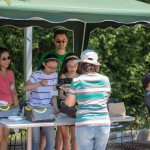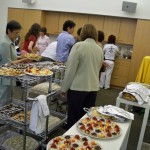John 6:60-69
We’ve all had the experience of going into a restaurant and ordering a meal – it’s decision time – we have to decide on one of five different salads – we have to decide on one of six different salad dressings – we have to decide on what kind of bread we want – we have to decide on our main course, decide on a choice of wine, on a dessert. Decisions, decisions.
A Spanish philosopher once said, “Living is a constant process of deciding what we are going to do.” Someone else said “In each decision, we must look beyond our decision at our past, present and future state and at others whom it affects and see the relation of all these things. And then we should be very cautious.” All our decisions have consequences, for ourselves and for others. The peoples of the First Nations had a policy that required of them that before they made any great decision as a people they had to consider what impact their decision might have on the sixth generation from now. We don’t even think of the next generation.
There is a great quote from Viktor Frankl – a German Jew psychiatrist who survived the Holocaust and wrote the book, Man’s Search for Meaning. He survived his ordeal by holding on to the truth that “man does not simply exist but always decides what his existence will be, what he will become in the next moment.” He said that was the one freedom the Nazis could not take from him, his freedom to decide what he would become in the next moment.
Today’s scriptures are all about decisions. Joshua recounts the entire history of God’s taking care of Israel, beginning with the Exodus. Joshua reminds the people that the One God had always been faithful to them even though they had not always been faithful to God. Confronted with the facts of their faith, standing firmly on the security of the land of abundance and life, Joshua demands they denounce any other gods and profess their faith in the God of Abraham, Isaac, Jacob, Moses. He reminds them that the Lord had served them in the past and asks that if they will serve the Lord in the future. What was good enough for Abraham, Moses, is good enough for Joshua and his family – as for me and my house, we will serve the Lord. Others must make up their own minds.
In the gospel, Jesus offers Himself to the people as living bread, bread come down from heaven, bread that promises everlasting life. Those in his hearing had seen him feed the five thousand – but now he offers himself – his flesh to eat, his blood to drink as nourishment. His offer is met with shock – this is a hard saying, this borders on madness – His gracious offer is met with rejection – and many of his followers walked with him no more – His gracious offer is met with acceptance – Lord to whom can we go, you have the words of everlasting life.
I think Peter was saying to Jesus, ‘I really don’t know what you are talking about, eating your flesh, drinking your blood, this is a hard saying – but I trust you and I’ve decided to stay with you. Later Peter would waver in that decision but in the end he remained faithful.
Going back to Viktor Frankel who maintains that we do not simply exist but that we always make decisions as to what our existence will be and what we will become in the next moment, the truth of the matter is, every day of life we decide what kind of a person we will be, will we be kind, tenderhearted, patient with others, forgiving of others – will we be imitators of God – imitators of Christ, Who loved us and gave His life for us? Every day we decide what kind of husband or wife – what kind of son or daughter, brother or sister, what kind of friend or neighbour we will be. We know from experience that when we are faced with certain life choices – the teachings of Christ may be hard, confusing, difficult teaching we feel we can’t accept – we may be tempted to walk with Him no more. We can forget Jesus has the words of everlasting life – we forget that decisions have consequences.
As we continue to celebrate this Mass we can pray for ourselves and for each other that we be graced with the willingness to begin each day echoing the words of Joshua – as for me and my house, we will serve the Lord – let me live this day in Your presence, in Your love and in Your service. Let me live this day as one who imitates Christ, for He has the words of everlasting life. May we always use wisely the gift God gave us – the freedom to make decisions as what our existence will be and what we will become in the next moment of our lives.
 Founded by St. Paul of the Cross, every Passionist takes a special vow to spend his or her energies in promoting remembrance of the sufferings of Jesus, the memory of the Cross, and reflection of the meaning of the Cross for the world.
Founded by St. Paul of the Cross, every Passionist takes a special vow to spend his or her energies in promoting remembrance of the sufferings of Jesus, the memory of the Cross, and reflection of the meaning of the Cross for the world.




